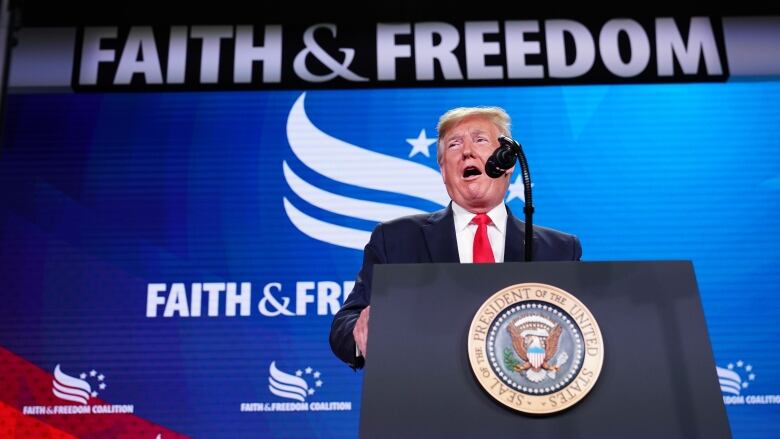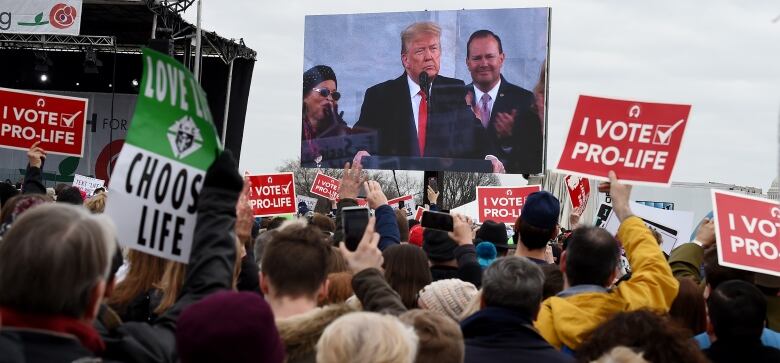Trump's conservative Christian support flows from a specific perspective on issues of church and state
Right-wing U.S. Christians have engineered an almost parallel version of the faith, writes Michael Coren

This column is an opinionby Michael Coren, a columnist, broadcaster, speaker, and the author of 17 bookspublished in 12 languages. He is also anordained cleric in the Anglican Church of Canada.For more information aboutCBC's Opinion section, please see theFAQ.
Alistair Campbell, advisor to former British Prime Minister Tony Blair, once famously said, "We don't do God." Canadian politicians don't much either, but Americans of both major parties do so in abundance and it's on full display in the run-up to the U.S. election.
One of the ironies of the United States is that a country that so roars about the concept of the separation of church and state has a political system so drenched in religiosity. The divinity's followers vote in enormous numbers and many U.S. politicians are genuine believers, whatever their party allegiance.
And then there is Donald Trump. Even though he won the support of more than 80 per cent of white evangelicals in 2016 and is still highly popular with Christians of many denominations, there's little sign that he's an authentic person of faith. His personal behaviour is unusual for someone who says he is a Christian, and his policies routinely appear to be the antithesis of the Gospel values of peace, love, and justice.
Yet the support for Trump exhibited by many people of strong religious faith is not the contradiction it might seem, and to understand it we need to grasp the reality of modern conservative Christianity in the United States.

Right-wing U.S. Christians have engineered an almost parallel version of the faith, one that is centred on a collection of themes that have also appeared in Trump's political manoeuvring:
- Religious freedom, viewed from a perspective that balks even at limitations on the size of church gatherings during the pandemic to protect public health.
- Gun rights, with armed self-reliance seen as a biblical virtue, when in fact Jesus is regarded as the Prince of Peace.
- Support for Israel, not because they're especially pro-Jewish but due to an eschatology that looks to an end-times war between Israel and its enemies leading to the Second Coming.
- Resistance to LGBTQ2 equality.
- Most important of all, a deep objection to abortion.
Although Jesus never mentioned abortion and it's hardly referred to in the Bible, defending the fetus has taken an iconic place in evangelical and conservative Catholic ideology, with many referencing the commandment "Thou shall not kill."
While Trump has stated in the past that he is "very pro-choice," he suddenly adopted an anti-abortion position when he entered politics. He is the first president to speak at the enormous March for Life in Washington and he supports the movement at every opportunity, especially if there is a camera or crowd present.

Indeed, his nomination to the Supreme Court of Amy Coney Barrett was as much about her opposition to abortion as her legal qualifications. Witness the hundreds of anti-abortion activists who demonstrated each day outside of the nomination hearings many in the Christian right, a group usually not quite as forgiving as the God they worship, will forgive almost anything the president does as long as he hints that Roe v. Wade might be overturned.
But this is only part of the evangelical Christian motivation for supporting Trump.
To give an historical or theological veneer to all of this, some within conservative American church culture argue that Donald Trump is the modern equivalent of Emperor Constantine or King Cyrus II.
The former was a Roman Caesar in the early fourth century, a late convert to Christianity who gave it fervent support. The latter was a Persian monarch 2,500 years ago, who allowed the conquered Jewish people to return to Jerusalem and rebuild the temple. Both men were deeply flawed, and thus the comparison. While President Trump may have behaved appallingly, some people of faith argue that his private life and even some of his policies mustn't obscure that he enables goodness to flourish by fighting abortion, supporting Israel and issues like gun rights, and defending Christians who claim that they're being persecuted.
However outlandish that claim of persecution may be, they insist it will become exponentially worse if Donald Trump is defeated.
That view of reality can be seen in things like the conservative Christian reaction to the Democratic convention earlier this year. It was stated repeatedly by Trump supporters that the Democrats had expunged "God" from their speeches. It was completely untrue, and in fact the Democratic party seems to have gone out of its way to win over at least some of the Christian vote in November, but how effective this effort has been remains to be seen.
Donald Trump will continue to bash away at the same old hymn-sheet talking points in the closing days of the U.S. election campaign, and no matter how frustrating it may seem to some observers, it works.
- This column is part of CBC's Opinion section. For more information about this section, please read ourFAQ.












_(720p).jpg)


 OFFICIAL HD MUSIC VIDEO.jpg)
.jpg)



























































































